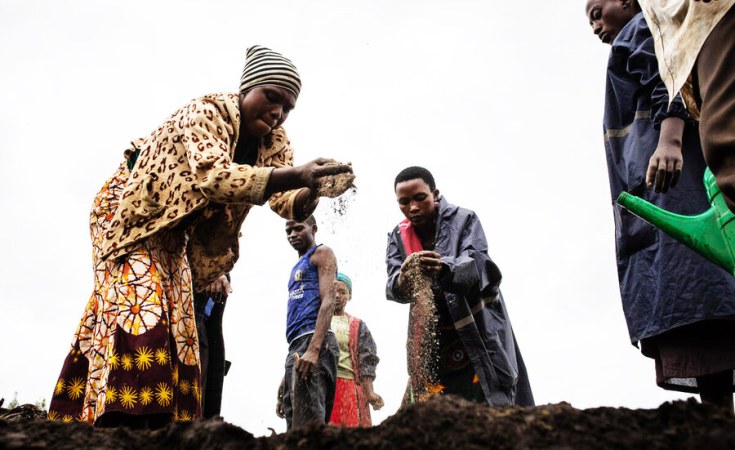Lessons from East Africa's most ambitious and under-resourced response to refugees
To drive into a refugee settlement in Uganda is to drive into hope. Refugee houses stand proudly alongside those of host communities - a testament to what happens when you invest in a refugee response, providing displaced people a degree of security amid crises.
The World Food Programme reaches 1.4 million, out of the 1.5 million, refugees in Uganda with food assistance and livelihood interventions, Yet our funding is at a historical low.
WFP targets refugees across all 13 refugee settlements and neighbouring host communities in Uganda in what is our most under-resourced response in Eastern Africa.
A sustainable refugee response anchors on people who open their hearts, homes and country to the most vulnerable. In Uganda, which has the highest refugee population in Africa, people fleeing conflict and climate crises find a place where they can heal and rebuild their lives.
Its refugee policy is much lauded for being inclusive and progressive, yet increasing crises have led to dwindling resources.
In line with international commitments such as those laid down in the Kampala Convention to address root causes of displacement - including climate impacts - and to provide refugees with the support they need to survive crises and build self-reliance, a refugee response will be sustainable only if there is a focus on climate adaptation.
That is, it must prepare refugees and host communities to conserve the environment and adapt to changing climate contexts. We must invest in renewable energy to ensure refugees have access to clean fuel that preserves their health and the environment.
It is also important to sow and nurture the culture of tree planting to safeguard food systems while making sure refugees and host communities are included in decision-making processes that impact their environment and lives.
Take cleared acres of land, destruction of crops and livestock, the searing heat of the dry season, the unforgiving floods in rainy season - a direct result of climate change - and tensions that might lead to conflict between refugees and host communities are easily stoked.
In the Nakivale settlement, in the southwest of Uganda near the border with Tanzania, for example, extreme weather conditions affect people's livelihoods. In the dry season, the bare land is starved of trees to counter the heat from the harsh sunshine.
Plants die, food becomes expensive, and many go to bed hungry. In the wet season, rivers and swamps overflow into homes and gardens - causing destruction to houses, assets and crops, exacerbating diseases such as malaria.
Similar scenarios play out in Kyangwali refugee settlement, in the southwest's Hoima district where the great Bugoma forest is struggling to maintain a semblance of its old majesty as people encroach it for firewood, timber, and farming land. In the northwest, the already mostly rocky land is struggling with exhaustion from overcultivation.
Welcoming people fleeing crises is an international obligation but also an inherent part of the Ubuntu spirit of the people and Government of Uganda.
Climate change is worsening the living conditions of refugees and their hosts.
Uganda's refugee response is already severely underfunded - working with the UN Refugee Agency and the Government of Uganda, WFP is only currently able to assist people who are most at risk.
Around 14 percent of the refugees are considered highly vulnerable and receive food rations at 60 percent; 82 percent are categorized as having medium vulnerability and receive 30 percent food ration. (Around 4 percent of refugees are considered self-reliant.)
The situation is particularly hard for women who are fleeing crises as often they also carry the responsibility of finding food for their families even in the face of difficult climatic conditions.
So funding must not only consider emergency and long-term livelihood needs but also make sure food systems - all the stages of getting food from farm to fork - receive the support they need.
Funding the refugee response to become more sustainable changes lives, boosting families, communities and, in turn, the country's economy. In 2022, WFP in Uganda provided US$42 million in cash-based transfers to refugees and distributed 73,800 metric tons of food.
In addition, we spent US$71.7 million on local procurement, supporting smallholder farmers to produce better quality food for the nation while earning a decent living. Over 80 percent of WFP's total annual procurement is done locally. And every dollar WFP spends on procuring goods and services generates a US$6 contribution to the country's total annual production.
But the question remains: can a protracted response survive as the world prioritizes newer crises while forgetting old and equally important ones? Can we work together to create a holistic response that can enable people and the environment to survive not just today but tomorrow too? It's surely time to demand more investment to make Uganda's refugee response more sustainable.
Abdirahman Meygag is the World Food Programme's Country Director and Representative for Uganda


